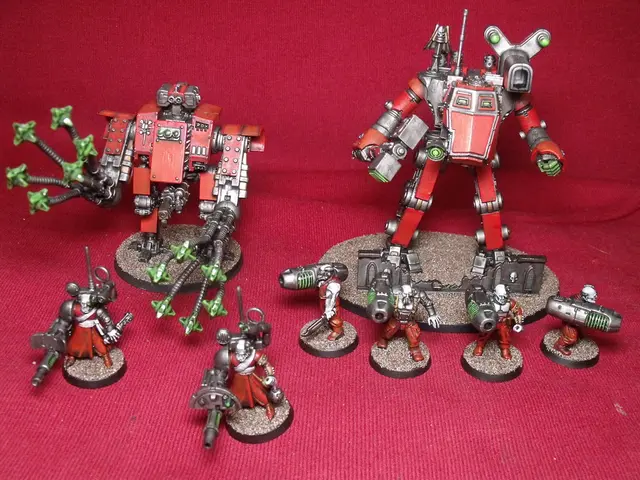Mall Culture Mirrors Society's Dynamics - Revising Mall Industry's Emphasis, as Stated by Dina Bunce
A New Era for Shopping Centers: Multifunctionality Redefined
It's high time to breathe new life into the shopping mall industry, which has bounced back post-pandemic. Contrary to what some may believe, multifunctionality has always been a cornerstone of shopping centers. They've never been one-dimensional ventures - they've been and continue to be hubs of fashion, entertainment, services, social responsibility, and more. That's why shopping malls today are no longer just shopping destinations - they're becoming microcosms of society that need to adapt to cater to various social groups, offering meaningful, multidimensional experiences.
Multifunctionality: More than Just a Trend
Fashion, entertainment, services - it's not just numbers (40:30:30), it's a system that shapes customer experiences. How we adapt this system to specific environments is our challenge. And while multifunctionality might seem new, it's probably time we look back at the industry's history and learn from it, together.
Shift in Focus: From a List of Shops to a Public Function
We often boast about the new shops opening, renovations, and innovative concepts in the industry. But it's like discussing various engine parts without considering the car's destination. For a modern shopping center, that's not enough. It has to be a place that adds value not just for businesses, but also for families, seniors, young people, culture enthusiasts, sports lovers, and all civically engaged persons. In other words, the role of shopping centers needs to become far more multi-layered, deeper, and meaningful.
Domina Shopping, with its 117,000 m2, sets a stellar example of this approach. It's not just a platform for big international brands, but also for small local businesses like Umami Wok'n'Roll, Hottt, AIOO tech shops, and Loon accessories store. Additionally, it provides space for social initiatives based on various societal values, hosting events like seminars for expectant parents, charity fairs, free stylist consultations, and family events. We're committed to engaging with society in a diverse and inclusive manner.
Sustainable Malls: Building Strong Relationships and Embracing Green Practices
Relationships with tenants form the foundation of sustainability. It's not just about signing lease agreements, but about building trustworthy, long-term connections on a daily basis - a principle Domina Shopping has been following for years.
Sustainability means taking action, not just talking. While thinking green may no longer surprise, ignoring it would be a risky move, both for the environment and for business. That's why Domina Shopping is committed to adhering to sustainability standards, such as BREEAM certification, not just to please its tenants, but because it believes in sustainability as a business norm.
Lastly, Domina Shopping coexists with e-commerce. Contrary to some beliefs, brick-and-mortar stores are far from dead. In-person shopping is experiencing a renaissance, enhancing the human shopping experience, with authentic emotions and personal service being irreplaceable.
Shopping Malls: More Than Just a Third Space
In international practice, shopping malls are often referred to as "the third space": after home and work, malls are the third place where people spend their time. They're not just shopping destinations, but also eating and exercising spots, service centers, and entertainment hubs. Furthermore, they've become places where people can fulfill their civic duties - like voting in elections. Domina Shopping has been providing this opportunity for years and will continue to do so in upcoming elections.
Looking forward, I believe shopping malls and other major facilities, as well as urban environments in general, should become more integrated. In line with European and global trends, it's time to develop neighborhoods in Latvia where shopping malls are part of broader public infrastructure, alongside concert halls, sports arenas, exhibition centers, and large food courts, creating a truly multifunctional, urban-integrated environment where practical needs and culture, sport, entertainment, and community experiences merge.
About Domina Shopping
Domina Shopping is one of the largest shopping centers in Riga and Latvia, offering a wide and convenient shopping experience with over 175 stores. It's home to the Baltics' largest indoor entertainment center - Apollo Skypark. Domina Shopping is owned and managed by EfTEN DOMINA. Located at Ieriķu Street 3, it's strategically positioned between two of Riga's main traffic arteries - Čaka and Brīvības Streets. It meets the highest energy efficiency standards, as confirmed by the ISO 50001 certificate. Learn more at www.domina-shopping.lv and on social media - Facebook, Instagram, X, and TikTok.
Shopping centres have evolved from single-purpose retail spaces into multifaceted urban hubs, integrating a variety of services and activities. This transformation is driven by shifting consumer preferences, urban development needs, and sustainability goals, as seen in:
- Early Development: Initially, shopping centers focused on retail, but began incorporating additional facilities as urban landscapes evolved, such as food courts, entertainment options, and office spaces.
- Modern Multifunctionality: Today, shopping centers often include diverse services, entertainment options, sustainability initiatives, and sometimes even residential and office spaces.
- Community Hubs: By offering a range of services and activities, shopping centers become central gathering places for communities, fostering social interaction and a sense of belonging.
- Economic Growth: Multifunctional shopping centers can contribute to local economic development by creating jobs and stimulating local commerce.
- Environmental Responsibility: By adopting sustainable practices, shopping centers can reduce their environmental impact, aligning with broader societal goals for sustainability.
- Shopping centers have evolved beyond their initial retail focus, integrating a variety of services and activities to cater to diverse needs, such as home-and-garden stores, business services, real-estate agencies, and even investing opportunities in financial sectors.
- As part of this transformation, shopping centers have started embracing green practices, not only to meet tenants' expectations, but also to invest in a sustainable future, with certifications like BREEAM becoming part of their business strategy.
- In line with these changes, shopping centers are becoming more than just third spaces, offering lifestyle experiences that encompass dining, exercise, personal services, and even cultural events, creating a vibrant atmosphere that fosters a sense of community.
- Such multifunctional spaces are not only economically beneficial, as they stimulate local commerce and create jobs, but also environmentally responsible, as they contribute to sustainable urban development.
- It's essential for shopping centers to continue adapting to remain relevant in the modern era, integrating with other urban facilities, such as concert halls, sports arenas, and exhibition centers, fostering a truly integrated, multifunctional urban environment.







